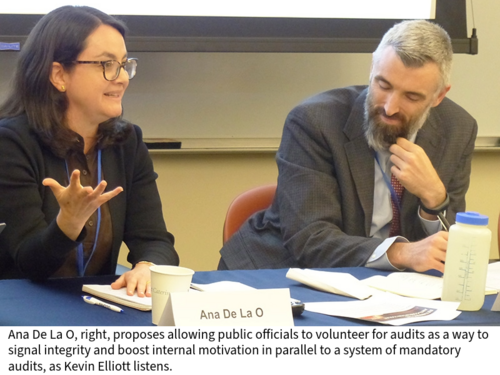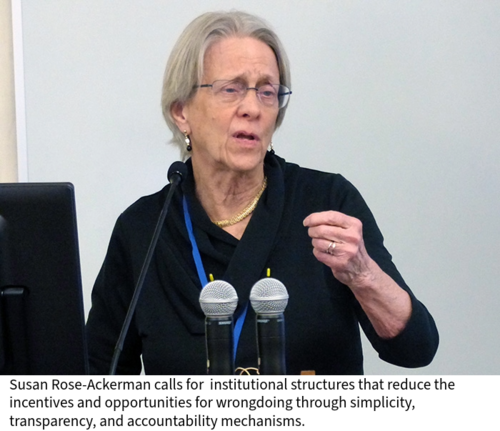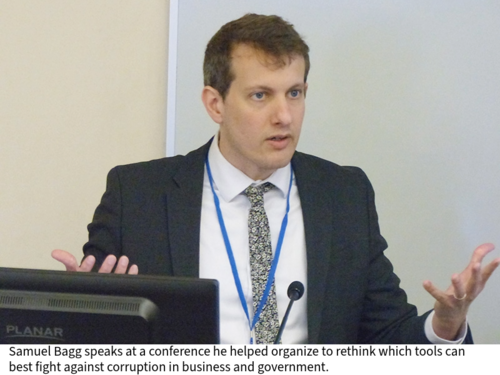Experts at Yale Explore New Tools to Tackle Corruption

During the Renaissance in Venice, someone nominating a candidate for public office made a personal pledge, mixing money and politics in a way that might trigger surprise from modern observers. At that time, the person making the nomination accepted legal responsibility for paying any fines or restitution arising from the candidate’s misconduct in office.
“This mechanism thus discouraged the advancement of untrustworthy, overly ambitious, or factionally driven individuals,” said Emily (Sal) Salamanca, a graduate political science student at Princeton University. “Instead, it reinforced collective responsibility and encouraged useful, internally policed decision-making among the enfranchised.”
Salamanca joined scholars and practitioners of law, policy, business, history, and political science for a two-day conference at Yale’s Institution for Social and Policy Studies to rethink which tools today can best fight against corruption in business and government.
“This is a bit of an experiment,” said Samuel Bagg, an assistant professor of political science at the University of South Carolina, who organized the conference with Kevin Elliott, a lecturer in the Ethics, Politics & Economics (EP&E) program at Yale. “We are trying to cross-fertilize ideas, speak to different audiences, think through problems in new ways, and find new ways of dealing with the problems that we know all too well.”
The conference was sponsored by Democratic Innovations, an ISPS program focused on identifying and testing new ideas to improve the quality of democratic representation and governance. The program supports postdoctoral associates studying public policy, political behavior, elections, and more. Recently, it has hosted a conference and funded papers on government and the politics of problem-solving, hosted a conference on artificial intelligence and governance, helped launch a student-run organization leading the nation’s largest youth political survey, and funded a student-run citizens’ assembly to engage undergraduate students on matters of university policy.
“Government power is critical to a dynamic and inclusive society, but concentrations of power are also opportunities for graft, dangerous incompetence, and oppression,” said ISPS Director Alan Gerber, Sterling Professor of Political Science. “Sam and Kevin focus on this enduring tension in democracy. They seek to understand how we might use our experience to recognize corruption in all its facets and design institutions to control it. Their conference is an outstanding example of how Democratic Innovations seeks to identify these types of problems and explore ways to design institutions for effective and responsive government.”
Susan Rose-Ackerman, Henry R. Luce Professor Emeritus of Law and Political Science and professorial lecturer in law at Yale, cautioned against using the term “corruption” too broadly, arguing that it risks conflating a wide range of problems under a single, overly moralized label.
“It seems to me it’s an overreach to use that label for all kinds of bad things that happen,” Rose-Ackerman said, suggesting such broad use could obscure specific mechanisms at play, such as poor design, misaligned incentives, or systemic dysfunction.
She emphasized the need for institutional structures that reduce the incentives and opportunities for wrongdoing through simplicity, transparency, and accountability mechanisms.
“We should be thinking about solutions which do not require everybody to become a saint,” she said.
Zephyr Teachout, professor of law at Fordham Law School, advocated for a broader, more historical definition of corruption, rooted in classical political theory.
“The difference between tyranny and a monarchy is the tyrant looks to his own advantage,” Teachout said. “The king’s staff is serving his subjects.”
She defined corruption as governing power wielded selfishly, including monopoly power, private governance, and systemic inequality — not just bribery or fraud. And she called to revive anti-monopoly tools, such as breaking up companies, restricting conduct, and enforcing non-discrimination policies.
“The entire anti-corruption movement since 1996 has failed,” Teachout said. “We’ve divorced campaign finance from antitrust, and that’s a mistake.”
Bagg, Yale College ‘09, has called to redefine democracy’s purpose not primarily as the expression of a population’s collective self-rule but as the need to prevent the capture of state power by private interests.
At the conference, Bagg advocated for deploying sortition — randomly selected citizens’ assemblies — to disrupt elite capture of government functions, emphasizing binary decision-making and narrow mandates to reduce training needs and opportunities for manipulation by special interests.
“Sortition blocks the ability of powerful groups to influence who occupies official positions,” Bagg said, proposing its use in corporate governance, unions, and social movements as well as citizen oversight juries to review administrative decisions. “To maximize its unique advantages, you need to minimize the amount of training and facilitation needed, which reduces the risk of capture.”

Paul Dunn, a professor of business ethics at Brock University, kicked off the conversation identifying three mechanisms through which some businesses deceive the public: lies, harmful silences, and decoupling — defined as formal policies not matching actual practices.
“Too often we are teaching future business leaders how to create false impressions in the minds of stakeholders,” Dunn said as a warning against decoupling. “Presumably with the goal of deceiving them into believing that the company is legitimate when it’s not.”
Marc-André Gagnon, an associate professor at Carleton University School of Public Policy and Administration, discussed ghost management, a term describing corporate strategies that covertly shape scientific research, regulation, and public discourse. For example, pharmaceutical companies deploy publication plans to inflate claims about their products or selectively report results in scientific literature.
“The purpose of corporations is not to produce wealth, but to maximize profits using all forms of corporate power and ghost management strategies to control and produce the social determinants of value, such as scientific narratives,” Gagnon said.
Brian Highsmith, a Ph.D. candidate in government at Harvard University, talked about historical and current “company towns,” such as Disney’s Reedy Creek Improvement District in Florida, where, until recently, the corporation had governed its own land use with minimal public accountability.
“Disney didn’t actually need to bribe anyone in order to achieve its goals,” Highsmith said. “It achieved them perfectly through institutional design.”
Barry Mitnick, professor of organizations & entrepreneurship and of public and international affairs at the University of Pittsburgh, identified five structured processes by which fraudsters make themselves better off: demanding, taking, diverting, steering, and assuring. He said all scams employ one or more of these mechanisms and follow recognizable patterns. And that identifying those patterns and their mechanisms may aid efforts at detecting and deterring scams.
“Fraudsters are not innovative,” Mitnick said. “They tend to opportunistically copy what worked in the past.”
Jeff Gordon, associate research scholar and fellow in private law at Yale Law School, warned that industrial policy can lead to market concentration — but can also give governments leverage to enact other key structural reforms to corporate governance. He proposed capping subsidies, spreading government funds across multiple firms, and implementing structural remedies — such as spinning off divisions of large firms or having them share data rights with the public to incubate public options for the future.
“If the market was so concentrated that you really only had one plausible recipient for your industrial program in the first place, we should find what we can do in the deal to deconcentrate that market going forward,” Gordon said.
Danielle Warren, professor of management and global business at Rutgers Business School, talked about a framework she has developed to describe second-order sanctions — formal or informal sanctions that respond to or modify the effects of earlier sanctions. She explained how second-order sanctions can reinforce, neutralize, or co-opt previous sanctions, arguing we must understand these dynamics to identify when unethical behavior becomes normalized or even rewarded across multiple layers of an organization or system.
For example, Warren mentioned an Atlanta School District cheating scandal, which involved rewarding schools for high student performance but instead created pressure on teachers to change test scores.
“Identifying the hidden linkages between sanctions is particularly important for preventing collective corruption,” Warren said. “The literature misses the big picture and treats sanctions as discrete, unrelated events. I see a large web or cascade of sanctions tied to employee behavior.”
In roundtable discussions, Ana De La O, associate professor of political science and director of EP&E at Yale, focused on the challenges of curbing corruption in local governments in Latin America, particularly in contexts where judicial systems are weak.
She said that for an auditing system to effectively deter corruption, it needs not only a high probability of an audit, but also an audit with a high probability of detecting corruption without false positives. And there needs to be significant costs paid following the detection of corruption.
“Importantly, this is a multiplication equation,” De La O said. “If any of these factors fall to zero, the result is zero. There is no deterrent effect. The system collapses.”
In addition, she distinguished between outright corruption and mismanagement or shirking, which may stem from a lack of motivation, training, or resources rather than malicious intent. She proposed allowing public officials to volunteer for audits as a way to signal integrity and boost internal motivation in parallel to a system of mandatory audits, while emphasizing that the broader political environment shapes the effectiveness of anti-corruption tools.
“The parameters in the system are the product of political processes,” she said. “That is what makes it very challenging.”
Alexandra Minsk, a Ph.D. candidate in political science at Stanford University, examined government consultants and their role in regulatory capture, proposing stronger ethics rules and conflict disclosures.
Ximena Benavides, a postdoctoral associate and lecturer at EP&E at Yale and a resident fellow at Yale Law School’s Information Society Project, critiqued the current model for biomedical innovation, arguing that funding at the National Institutes of Health and patents do not align with public interest to promote the progress of science.
“We should redefine the content of progress for which they aim,” Benavides said. “Framed by the constitutional ideals of equality and fairness.”
She proposed treating federal grants as “relational contracts” to better balance ownership and access incentives, thereby providing the public with a greater return on its investment.
Hélène Landemore, ISPS faculty fellow and co-director of Democratic Innovations, reflected on France’s Citizens Conventions, warning of institutional capture and advocating for more citizen control of the assemblies with rotating citizen leadership.
“We need to move to a model of self-run citizens’ assemblies where you don’t have 15 experts like me on top.”
Matthew McCoy, assistant professor of medical ethics and health policy at The University of Pennsylvania’s Leonard Davis Institute of Health Economics, discussed patient advocacy organizations and their corporate entanglements. He warned that funding for pharmaceutical companies can distort public health priorities.
Sarah Haan, Class of 1958 Uncas and Anne McThenia Professor of Law at Washington and Lee University School of Law, emphasized the democratic structure of the corporation and its parallel evolution alongside American political governance. She described the failure of corporate governance to develop effective mechanisms of shareholder collective action and its narrow focus on shareholder value.
“Corporate leaders have enormous power over innovation, labor, and politics but are not accountable,” Haan said. She invited discussion on reforms that would strengthen the democratic features of corporate governance.
Ana Luiza Aranha, a leader for business integrity and anti-corruption efforts at the United Nations Global Compact, highlighted her work, emphasizing compliance programs and sector-wide initiatives.
“Compliance programs must go beyond checklists — we need behavioral change and collective action,” Aranha said. “There’s a proactive role for the private sector in reshaping markets in the fight against corruption.”
Elliott warned that when people believe all politicians are corrupt, they may become disengaged or unable to distinguish between degrees of wrongdoing. He argued that for anti-corruption efforts to succeed, the public must be able to recognize and agree on what constitutes corruption.
“Sometimes there’s corruption, but it’s not publicly salient,” Elliott said. “And other times there isn’t corruption, but everyone believes that there is. Without shared understanding, accountability breaks down.”
And while Elliott acknowledged the many overlapping problems in American democracy, he expressed optimism.
“We can take a pragmatic approach to reform,” he said. “While the system is deeply flawed, it is also full of potential leverage points.”
On the conference’s second day, participants grappled over whether anti-corruption efforts should focus on narrow technical reforms, such as disclosure rules and oversight mechanisms, or broader structure changes, such as institutional redesign and anti-monopoly measures. They expressed concern that overly technocratic approaches have failed over past decades, while expansive definitions risk diluting the concept of corruption.
In addition, participants stressed the need for collective organization — through labor unions, civil society, and professional groups — to counterbalance concentrated private and political power. They identified artificial intelligence as a tool for detecting corruption and a potential enabler of it. And they urged moving beyond transparency to tackle issues like money in politics, corporate concentration, and structural inequality.
The attendees agreed on the need to engage the public through storytelling. They discussed creating an online resource to offer a menu of anti-corruption strategies, design principles, and illustrative case studies.
“Though we come from different academic backgrounds, we all share a sense that anti-corruption work must be principled and pragmatic, imaginative and grounded,” Bagg said. “The resource we have proposed is not just a toolkit. It’s a platform for rethinking how we build institutions that serve the public good and resist corruption in all its forms.”